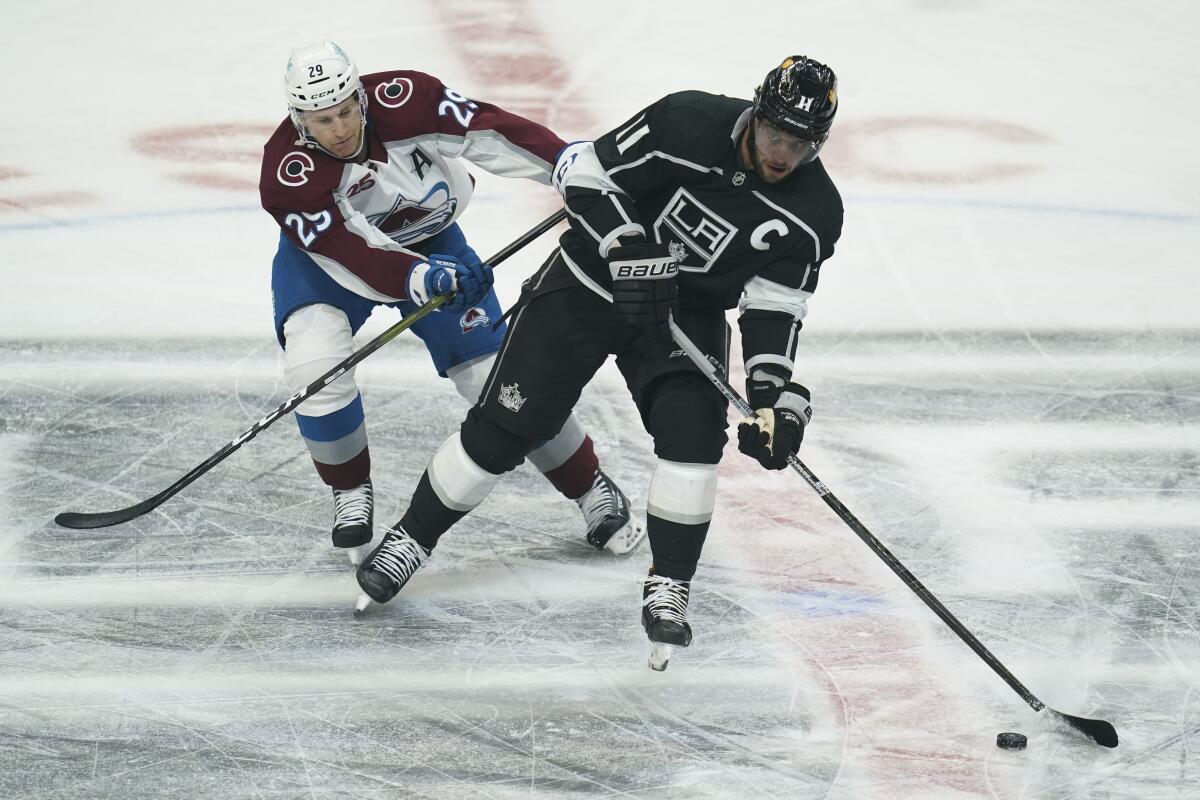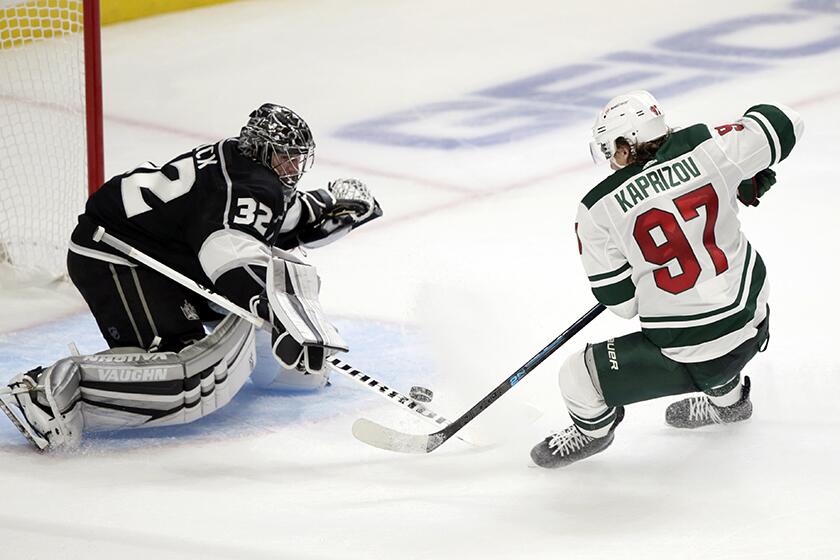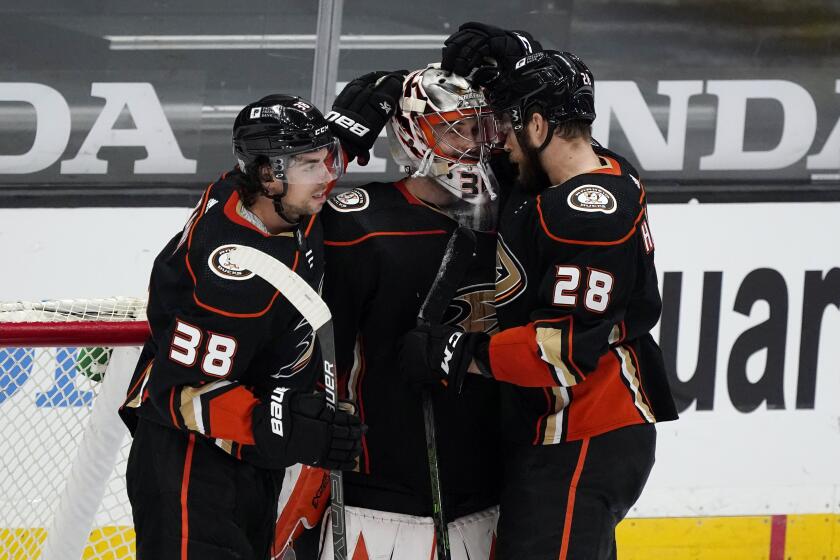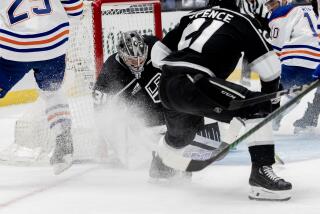Kings display template for success in first win of the season

- Share via
Todd McLellan didn’t get carried away by the Kings’ first win Thursday night.
Sure, the coach was excited and relieved by his team’s come-from-behind 4-2 victory over the Colorado Avalanche, their first triumph in 316 days following a pandemic-extended offseason.
But he was realistic too, reiterating that the Kings remain a “work in progress,” that they’re “nowhere near the finished product.”
“It wasn’t a Picasso,” McLellan said after the Kings overcame a two-goal first-period deficit. “But we don’t need perfection right now. We just needed a win.”
Indeed, Thursday’s result turned a potentially disastrous opening week into a halfway decent start for the rebuilding club.
It gave the Kings four points from their first four games and secured a series split against the Avalanche, who entered the season as a Stanley Cup favorite. It saw their first significant lineup alterations work to effect, culminating with Adrian Kempe’s game-winning goal in his first appearance on the team’s top line.
The Kings’ 4-3 loss to Minnesota was a mishmash of good and bad that shouldn’t have happened, even in a season opener that followed a 10-month break.
Most of all, it showcased a potential template for the Kings to follow for the rest of this season — where reliable goaltending, a revitalized power play and relentless even-strength forechecking lead the way.
“Maybe at the beginning, we gave them a little bit too much respect and kind of got caught on our heels,” captain Anze Kopitar said. “But then … we started forechecking, being more aggressive, spending more time in their zone. That’s ultimately what we want to do. That’s what you have to do in order to score goals.”
Kempe’s goal was the biggest tally, a close-range redirection that broke a 2-2 tie with less than four minutes remaining in regulation.
The sequence began in the Kings’ defensive end. Drew Doughty initiated a swift breakout. The new-look top line passed the puck into the Avalanche’s end. Near the end of the shift, Alex Iafallo fed Kopitar down low, who quickly centered a backhanded pass that glanced off Kempe’s stick and into the net.
“I tried to position myself in front of the net,” Kempe told Fox Sports West. “And Kopi obviously makes a hell of a play to me.”
The origins of the game-winning tally, however, can be traced back to two days prior, when the idea of rearranging the lineup first entered McLellan’s head.
Up to that point, the Kings had been undermined by frustrating mistakes: too many undisciplined penalties, blown third-period leads against the Minnesota Wild. By the second intermission Tuesday, they trailed the Avalanche 3-0 in the first of a two-game set.
At the beginning of the third period that night, McLellan decided to shuffle his forwards. Though the Kings didn’t pull off the comeback, their two third-period goals encouraged him to continue tinkering for Thursday.
The Kings will display the logo of the California HOPE Crisis Counseling Program, a mental health and wellness initiative, on their helmets this season.
“We’re not going to put everything into a blender,” McLellan said before the game. “It’s just trying to find a few more players, get them up and running, a little bit better, a little bit quicker.”
As such, Kempe was inserted in the top line to give the unit more speed. Dustin Brown joined Gabriel Vilardi and Lias Andersson on the third line, strengthening the trio’s ability to forecheck.
Fourth-line center Michael Amadio and third-pairing defenseman Kale Clague, who had both previously been healthy scratches, returned to action and bolstered the team’s depth. The top blue-line pairings were mixed around early in Thursday’s game as well, with rookie Mikey Anderson joining Doughty for the first time all season.
Such changes weren’t a necessity. In the Kings’ first three games, the penalties had been the biggest problem. Entering Thursday with the second-most penalty minutes per game in the league, the team had struggled to sustain momentum while constantly conceding man advantages.
“I can’t begin to judge where we’re at until we clean that up,” McLellan said Thursday morning.
On Thursday night, the Kings finally did. They committed a season-low four infractions, including just one in the third period. They also scored multiple power-play goals for the first time, striking twice in the second to erase the Avalanche’s early 2-0 lead.
The final 14 minutes were played entirely at even strength, allowing McLellan to consistently roll his lines for one of the first times this year. Just as he’d hoped, the Kings’ most suffocating stretch of the season ensued.
“The other three lines got to roll a bit more,” said McLellan, who in previous games had bemoaned the way numerous penalty kills disrupted the balance of playing time for his team. “You know, let’s face it, we need 20 [players] a night to win. There’s some teams that could probably get by with 15, but we need 20 a night.”
Goaltender John Gibson made 34 saves during the Ducks’ 1-0 win over the Minnesota Wild on Monday. It was their first victory of the season.
Thursday was nonetheless “a stressful night throughout,” McLellan said, a far-from-flawless formula that still required several diving saves from goalie Jonathan Quick (who made 24 stops on his 35th birthday) and perfect top-shelf snipes from Doughty and Vilardi to mount the rally.
“We’re looking for some poise in certain situations,” McLellan said. “I think physically we want to do the right things [but] mentally we’ve still got to clear some things up. I’d like to see us pass and receive the puck a lot better. I think it’ll make us a faster team.”
But in a season that’s unlikely to see many masterpiece performances from the transitioning Kings, manufacturing more results like Thursday’s could be the key.
“We believe that we can be competitive,” Kopitar said. “But in order to be competitive, we got to check all the boxes, meaning power play has got to be firing, the PK has got to be firing, we’ve got to stay out of the box, we’ve got to have a good forecheck.
“The big picture has to come together for us to be competitive. But the work ethic is there. We’re definitely not lacking there. We have to learn and improve in some areas and learn how to win. I think tonight was a good indication on what we’ve got to do.”
More to Read
Go beyond the scoreboard
Get the latest on L.A.'s teams in the daily Sports Report newsletter.
You may occasionally receive promotional content from the Los Angeles Times.









